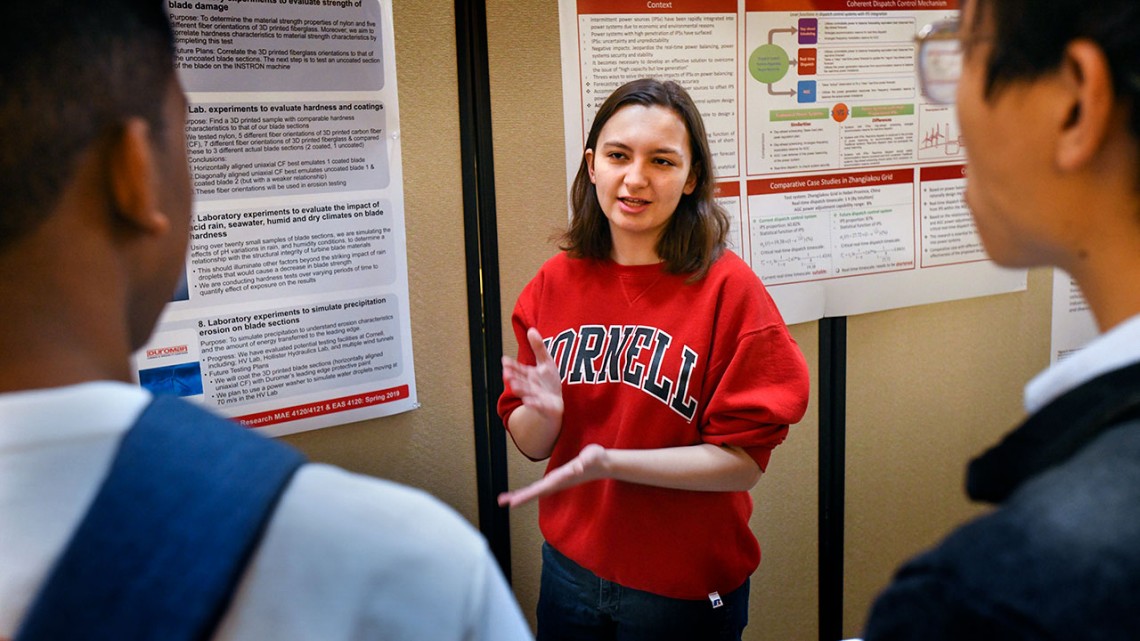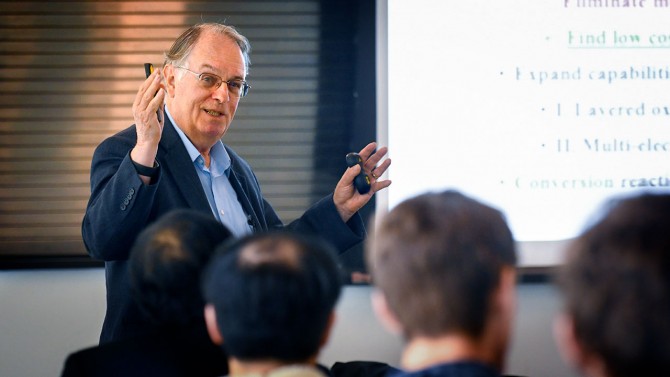
Emily La Spisa ’18, a systems engineering graduate student, presents her poster at Cornell Energy Day.
Energy Day unites students, researchers solving biggest challenges
By Syl Kacapyr
Students, researchers and companies working to solve some of today’s biggest challenges in the energy industry gathered April 10 for the inaugural Cornell Energy Day – a campus event for networking and examining innovative ideas for fueling the future.
The event, hosted in Duffield and Upson halls, was organized by the Cornell Energy Systems Club and included a keynote talk, poster session, presentations from energy companies and a panel with leaders from the energy industry.
“The thing about energy research on campus is it’s dispersed among different departments and in a half-dozen buildings, so this is about getting everybody in the same space so students with the same passions can meet each other,” said Jeff Sward, engineering postdoctoral student and club president.
The day began with a keynote address by M. Stanley Whittingham, professor of chemistry and of materials science and engineering at Binghamton University; he is credited with making a key breakthrough in the development of the rechargeable lithium-ion batteries that power many of today’s electronics.
Whittingham detailed his research that eventually led Exxon to commercialize the technology in the 1970s, and he provided thoughts on which materials battery scientists will be focusing on in the future.
“The big challenge now with millions of cars going electric and all of the toys in your pocket is the availability of materials,” said Whittingham. “Cobalt has to go. There’s not that much of it in the world, batteries are driving [up] the price, and there are huge child labor issues in the Congo with cobalt mining.
“There is an issue with the cost of nickel as well,” said Whittingham, who predicts lithium will remain the primary material of choice for at least the next decade.
The poster session showcased the breadth of energy research at Cornell and included designs for wireless power transfer to electric cars, a solar-powered geothermal heating and cooling system, and a control system for better integration of renewable energy into the power grid.
Farshid Salimijazi, postdoctoral student in biological and environmental engineering, exhibited a theoretical model that addressed one of Energy Day’s main challenges: how to store energy from renewable sources. His answer – an electrosynthesis system that can capture carbon dioxide from the air and use sunlight to photosynthesize different biofuels.
“We have renewable energy sources but we can’t store as much as we can produce, so we’re saying, ‘Let us store it as cheap as possible in two sustainable sources, carbon and sunlight,’” Salimijazi said. “It can be a biofuel or it can be a bioplastic, and then you put that into a fuel cell and convert it to electricity.”
Another goal of Energy Day was to connect students to potential employers, Sward said.
“Whenever our engineers would walk into career fairs there would be the big energy companies, but people wanted access to stuff in the startup space that is spun out of research. And so that’s one of the gaps we were trying to fill,” said Sward.
Cornell spinoff companies NOHMS and Conamix joined Binghamton-based ChromaNanoTech and C4V, and Silicon Valley-based Gotion, in presenting their research and development challenges, many of which involved improving battery technologies. A breakout session allowed students interested in those research areas to directly engage with company representatives.
A panel discussion involving several Cornell alumni tackled broader challenges in energy and decarbonization, including the economics of transitioning to renewable energy sources. Panelists included: Carl Taylor, president of New York State Electric & Gas; James Lyons, Ph.D. ’84, chief technologist of Capricorn Investment Group; Paula Doubrawa, M.S. ’16, Ph.D. ’17, research engineer at National Renewable Energy Laboratory; Michael Swider, senior market and technologies strategist at the New York Independent System Operator; and Sandra Sattler, Ph.D. ’08, research scientist at the Union of Concerned Scientists.
Sward thanked the Cornell Energy Systems Institute for supporting the event and credited its director, Lynden Archer, for helping to launch the new Cornell Energy Systems Club and Energy Systems Day.
Syl Kacapyr is public relations and content manager for the College of Engineering.
Media Contact
Get Cornell news delivered right to your inbox.
Subscribe

